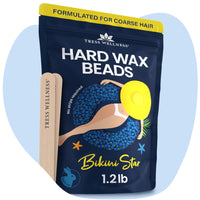Dark pores post-shaving, commonly referred to as ‘strawberry legs’, can be frustrating. This no-nonsense guide delves into how to get rid of strawberry legs with straightforward advice and proven methods. Here's your detailed roadmap from immediate remedies to long-term prevention, equipping you with the knowledge for smoother, spot-free legs.
Key Takeaways
-
Strawberry legs, characterized by darkened pores or dots, are caused by clogged hair follicles and can be managed with proper skincare, debunking the myth that they’re permanent.
-
Hair removal practices, particularly shaving with old or dull razors without moisturizing cream, as well as dry skin and lifestyle factors such as tight clothes, can exacerbate strawberry legs.
-
Effective remedies include choosing wax over shaving, maintaining regular exfoliation, and keeping the skin moisturized, while professional treatments like laser hair removal and chemical peels can offer more permanent solutions.
Understanding Strawberry Legs

In exploring the realm of strawberry legs, it’s vital to understand the reasons and nature behind this bothersome condition. Characterized by darkened pores or little dots that draw an unwelcome attention to our otherwise sleek legs, this condition is not merely a cosmetic annoyance but often a sign of underlying skin situations. Although the term ‘strawberry legs’ might evoke images of a permanent blemish, it’s important to debunk this myth: a correct approach can certainly treat, diminish, and even prevent these annoying speckles.
The Basics of Strawberry Skin
At the heart of strawberry skin, also known as chicken skin, lies the issue of clogged hair follicles or clogged pores, entrapping bacteria, dead skin, and oil—a perfect storm for those dark, pitted spots to emerge. And if you’ve ever felt singled out by this condition, know that it is more prominent on certain skin tones, especially when the shaven hair contrasts starkly against the skin color.
But regardless of your skin tone, the skin’s surface can be managed with a tailored skincare routine, nudging you closer to the smooth skin you desire.
Common Misconceptions
Now, it’s time to debunk some misconceptions. Strawberry legs are not a life sentence—far from it. With a bit of tender love and care, plus regular maintenance, you can see a noticeable improvement in as little as 2-3 weeks.
And while it’s true that certain skin conditions can play a role, it’s the consistent remedies, like exfoliation and moisturizing, that truly make the difference in managing this condition.
Uncovering the Root Causes
Before we explore the solutions, it’s important to comprehend the causes of these unwelcome guests. From the grip of folliculitis to the rough texture of keratosis pilaris and the well-known nemesis acne, our skin can react in ways that pave the path for the appearance of strawberry legs. But it’s not just skin conditions at play—our very habits, particularly those related to hair removal, along with certain lifestyle choices, can be the culprits behind those dotted legs.
1. Hair Removal Habits
Discussing hair removal is necessary—it’s a ritual for many but can also trigger strawberry legs. Those old, dull razors and the absence of a moisturizing shaving cream can cause irritation, razor burn, and ingrown hairs, all of which contribute to the condition.
When the razor glides, or rather tugs, across the skin, it can inflame hair follicles, leading to those tiny, pimple-like bumps that worsen the appearance of strawberry legs.
2. Skin's Surface Situations
But what’s happening on the skin’s surface? Dry skin, for one, can make the aftermath of hair removal even more irritating, highlighting those dark spots. And for those with darker skin pigmentation, the contrast between the dark follicles and the skin can make strawberry legs seem more evident, though it’s a common concern across all skin tones.
3. Lifestyle and Environmental Factors
Your wardrobe and workout might be fashionable and fulfilling, but they could also be contributing to your skin distress. Tight clothing combined with activities that cause friction and sweating can trap hairs under the skin and irritate the follicles, creating the perfect environment for strawberry legs to thrive.
Prevent Ingrown Hair Once and For All
Equipped with an understanding of the causes, we’ll now shift our focus to prevention. One of the most effective strategies? Choosing the right hair removal method. And when it comes to keeping strawberry legs at bay, waxing can be your best ally.

Choosing Wax Over Shave
Waxing, especially when using the Tress Wellness All-in-One Home Waxing Kit, offers several benefits:
-
Removes hair from the root, giving you longer-lasting smoothness
-
Reduces the chances of darkened pores
-
Specially designed wax beads minimize skin irritation, one of the chief architects of strawberry legs
Maintaining Hair Removal Results
After waxing, ensure to maintain that flawless state by avoiding the temptation to shave between waxing sessions. Shaving can undo the benefits of waxing by prompting quicker, coarser regrowth, which can make the appearance of strawberry legs more pronounced.
Here are a few ingredients that you can incorporate in your skincare routine to get rid of strawberry legs.
-
Salicylic Acid: An exfoliant that helps to dissolve dead skin cells and unclog pores, reducing the likelihood of ingrown hairs and dark spots.
-
Glycolic Acid: Another alpha-hydroxy acid that exfoliates the skin, promoting cell turnover and preventing the buildup that leads to strawberry legs.
-
Lactic Acid: A gentle exfoliant that also moisturizes, helping to keep skin smooth and preventing the formation of dark pores.
-
Retinol: A form of vitamin A that increases cell turnover and can help reduce the appearance of dark spots over time.
-
Jojoba Oil: Mimics the skin's natural oils, providing hydration and creating a protective barrier that can prevent irritation and follicle blockage.
-
Tea Tree Oil: Known for its antibacterial properties, it can help prevent the infections that can exacerbate the appearance of strawberry legs.
-
Witch Hazel: An astringent that can help tighten pores and reduce inflammation, potentially minimizing the appearance of dark spots on the legs.
Step-by-Step Remedies at Home
However, what if you have already noticed the signs of strawberry legs? Not to worry—there are remedies you can whip up right in the comfort of your home. From warm soaks to dry brushing, these simple steps can soften hair follicles and prepare your skin for a less abrasive hair removal experience.
Exfoliation Excellence
Exfoliation is key to keeping the skin clear and smooth. Whether you opt for a physical scrub or a chemical exfoliant like glycolic acid, the goal is to dissolve dead skin cells and keep pores from becoming clogged—a leading cause of strawberry legs.
Moisturizing Matters
After exfoliation, it’s crucial to maintain the skin’s moisture. This not only improves the look of your legs but also helps prevent the reoccurrence of those pesky spots.
Remember, hydrate while the skin is still damp to lock in that moisture.
Professional Interventions
For those who have experimented with every home remedy to get rid of strawberry legs to no avail, it might be worth considering professional treatments to prevent strawberry legs. From laser hair removalf to chemical peels, these interventions can target and reduce the conditions that contribute to strawberry legs, ultimately helping you rid of strawberry legs.
Laser Hair Removal Insights
Laser hair removal offers a more permanent solution by targeting the dark pigmentation in hair follicles. With a series of sessions, you can experience a significant reduction in hair growth and an improvement in the appearance of your legs, making it an effective method for permanent hair removal.
Advanced Skincare Solutions
For stubborn cases, a visit to the dermatologist might be in order. Chemical peels, particularly those with glycolic acid, can help to clear the skin and diminish the appearance of those dark, enlarged pores.
Summary
To wrap it up, strawberry legs are a common, yet treatable condition. With a combination of proper hair removal techniques, regular exfoliation, and moisturizing, you can achieve the smooth, spot-free legs you desire. For those tougher cases, professional treatments are available to help you reach your skin goals. So, take up the challenge, and make those strawberry legs a thing of the past!
Frequently Asked Questions
What is the cause of strawberry skin?
The cause of strawberry skin, also known as strawberry legs, is when hair follicles or pores get clogged with dirt, dead skin, bacteria, or oil. This can result in the appearance of brown, black, or red spots on the skin resembling strawberry seeds.
What lotion is best for strawberry legs?
The best lotion for strawberry legs is one that contains salicylic acid and lactic acid to gently exfoliate the skin and reinforce the moisture barrier.
Are strawberry legs genetic?
Yes, "strawberry legs" are typically caused by a condition called keratosis pilaris, which is genetic and common in people with dry skin or eczema. It's not harmful, but it can affect self-esteem.
How do you get rid of strawberry legs fast?
To get rid of strawberry legs fast, you can try using an over-the-counter product with salicylic acid or glycolic acid. Daily moisturizing and regular exfoliation can also help prevent and treat strawberry legs.
Can strawberry legs be prevented?
Yes, regular waxing, and maintaining skin hydration are effective strategies to prevent strawberry legs. These methods can help you avoid the appearance of strawberry legs on your skin.




